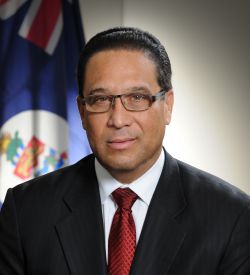(CNS Local Life): Premier Alden McLaughlin has commended the work being done by the Health Services Authority, Cayman AIDS Foundation and the Red Cross to educate and inform on HIV and AIDS, helping to prevent the spread of what is still an incurable disease. There are 67 people living with HIV in the Cayman Islands and in his message to mark World Aids Day, Thursday, 1 December, McLaughlin, who is also the health minister, said community support as well as health care is important to those suffering with HIV.
“We should never stigmatise anyone because they are HIV-positive,” he said.
HIV is still one of the world’s most serious health challenges and the latest United Nations figures show that 36.7 million people are living with HIV and AIDS including 1.8 million children. The World Health Organisation estimates that 35 million people have died from AIDS-related illnesses since the start of the epidemic in the early 1980s. The first case identified in Cayman was in 1985 and since then 145 people have been confirmed with the virus. Currently there are 39 men and 28 women living here with the disease.
There has been considerable progress on the treatment of the virus with new medicines but the premier, warning “we cannot become complacent”, urged everyone to take personal responsibility and adhere to safe sexual practices. He also encouraged people to make use of the free HIV testing on offer this week.
As to the challenge of tackling the global spread of the virus, the Pan American Health Organisation (PAHO) is urging governments to intensify measures to end the epidemic by 2030.
Providing and promoting the use of condoms and lubricants, providing HIV testing in areas frequented by the most at-risk populations, and expanding access to pre- and post-exposure prophylaxis are some of the measures that, if reinforced, could help end AIDS as a public health problem within 15 years, PAHO stated.
While the numbers in Cayman remain relatively small, nearly two million people are living with HIV in Latin America and the Caribbean. Each year, 100,000 people acquire the virus and 50,000 die from AIDS-related causes. Between 2000 and 2015, new HIV infections were reduced by 25% and deaths by 23%. But in the last five years, there has been a slight increase in cases.
“Today, we have more tools to prevent new infections, to diagnose all those who live with the virus and don’t know it, and to treat everyone as soon as possible to preserve their health,” said Dr Marcos Espinal, director of PAHO’s Department of Communicable Diseases and Health Analysis.
“Accelerating action of these and other measures can reduce the epidemic to the lowest level possible.”


